2 Volumes
Surviving Strands of Quakerism
Of the original thirteen, there were three Quaker colonies, all founded by William Penn: New Jersey first, Pennsylvania biggest, and Delaware so small Quakerism was overcome by indigenous Dutch and Swedes.
The Society of Friends
New volume 2019-05-23 17:20:54 description
Chapter Quaker Religion
New topic 2018-07-18 17:26:16 description
William Penn, Robert Barclay and the Ranters
 Before ranting, try to quake a little.
Before ranting, try to quake a little.

|
In both the 17th and 20th centuries, rejection of the rules of organized society was really a demand to have rules of behavior re-examined. Behind that, lay suspicion the world itself had greatly changed and needed new rules, or perhaps no rules. But in both cases, such restlessness eventually subsided after recognition that many minds had already faced the same issues, and had left a logical trail back to the same old conclusions. Oliver Wendell Holmes stated the matter effectively by intoning that "The life of the law has not been logic, it has been experience." In the case of science, experiments are discontinued when results are always the same. In the case of the common law, society's experiments in court are conducted by adversaries, so consensus takes longer. Both processes state the apparent logic, test it, and revise the logic to test it further; the goal is to reach a point where further questioning can subside. And the world can go on about its other business.
<Although Barclay, Penn and Pike mixed their conclusions together in several tracts, it seems likely that Barclay established the need for a gathered Quaker meeting, as contrasted with solitary meditation. A religion with no fixed dogma, except perhaps reliance on an inner light found in every man, and one which rejects appointing professional clergy, has difficulty preserving shared conclusions; it cannot grow. Reliance on the Bible, as one weighty Quaker gently put it, is to rely too heavily on faulty translations. The Catholic Church appointed priests. But in Protestant opinion, the Catholic tradition gradually wandered into the ceremony and inflexibly resisted going back to first principles. Barclay's identification of the sense of the gathered Meeting could begin with a blank slate. It would however constantly generate default positions, maintaining experiences that others had deeply contemplated. Without a meeting, even if not a word is spoken at it, Quakerism cannot thrive. Sitting at home alone is not the same as sitting in a silent meeting. Sooner or later, Quakers must sit together in a gathered community.
Some Quakers believe Barclay sometimes carried this reasoning too far. In his day, it was necessary to reject Catholic doctrines, while continuing to adhere to Protestant moral teachings. In a way, his position was similar to the American founding fathers just after ratifying the Constitution. It was essential for stability to maintain English common law until the new Republic had time to revise it, a process which took American courts several decades. The solution for Barclay was to go back to the writings of the Apostles prior to the Council of Nicaea in 325 AD. This helped manage the controversies of the 17th century, but has since raised uncertainty about how authentic the early records were, how inviolate they should now be considered.
William Penn, another close friend of the King, was also in a position quite unlike other Quakers. Whether from lack of concern for theology, or for more practical reasons, his position was as follows:
"...it is the root of Ranter-ism to assert, that nothing is a Duty incumbent upon thee, but what thou art persuaded is thy Duty...Although thou art not to conform to a thing ignorantly, yet thou art seriously to consider, why thou art ignorant..it then must needs to be in thyself, who has not yet received a sense for or against the matter, about which thou art in doubt."Penn's position seemed to be: before dissenting, examine the logic behind conformity.
Robert Barclay Justifies Quaker Meetings
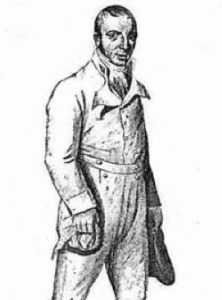
|
| Robert Barclay |
As part of the dissidence and Civil War of 17th Century England, Robert Barclay the Scotsman emerged with a point of view which was structured and reasoned in detail. What was almost unique was his reduction of it to a handful of pithy "Sound Bites". Coupled with membership in a prominent family, these abilities made him a particular friend of James, Duke of York, later King. Barclay became a Quaker at an early age.
The whole point of the Reformation was revulsion against the corrupt Catholic clergy, shielded behind some impossibly convoluted legalisms of doctrine. But for the governing establishment, any reform was going too far if it led to anarchy and chaos; combating disorder was then in many ways the central mission of the Catholic faith. The establishment did recognize that public revolt against universal micromanagement led to the scaffold for Kings who insisted on it. But in their view, the need for law and order still demanded some legitimacy, if not organized law. The Rangers, who paraded about stark naked and lived in ways resembling the hippies of the 1960s, were beyond the pale. Quakers, who professed no formal doctrine except silent meditation, might be possible just as threatening. After all, silent meditation could lead you anywhere including regicide. But the Quakers at least were quiet about it.
George Fox the founder of Quakerism had already provided one basis for containing fears of anarchy, by organizing local monthly meetings for worship within regional quarterly meetings; quarterly meetings, in turn, were within an overall framework of a yearly meeting. Occasional monthly meetings might develop a consensus for wild and antisocial behavior, indeed often did so, but would have to persuade the quarterly meetings whose members naturally outnumbered them. In extreme cases, the whole religion assembled in a yearly meeting. The innate conservatism of the meek would usually silence the extremism of the rebellious few. Very few kings would deny they could go no further toward despotism themselves, without the public behind them. The Quaker problem was to demonstrate what their consensus really was.
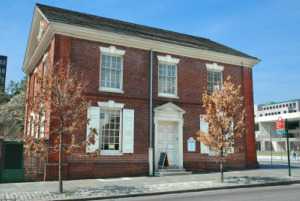
|
| Free Quaker Meeting House |
Essentially, the answer emerged that any religion which renounced a priesthood, which even renounced having a written doctrine, still needed some sort of institutional memory. If every Quaker began with a clean slate, to develop his own organized set of moral principles, then most of them would never get very far. Even if they did, they would have no time left for milking cows and weaving cloth. Single silent meditation was inefficient, particularly if you had faith that everyone was eventually going to arrive at the same convictions as the Sermon on the Mount. The founders of Quakerism took a chance, here. To assume the same outcome, you have to assume everyone starts with the same instincts and talents; even 21st Century America has private doubts about that one. Feudal England would have rejected it contemptuously. Carried to an extreme, it was a claim that everyone was as good a philosopher as Jesus of Nazareth, as good a person, as much a Son of God. That seemed like an arrogant claim. A more humble claim was that collectively, listening respectfully to one another in a gathered meeting, the whole world would over time reach the same truths as the Creator. If not, that still was as about as close as you were going to get to an oral memory, slowly building on the insights of the past.
Like all the early Quakers, Robert Barclay spent some time in jail. He did visit America in 1681, but it is doubtful if he spent any time here while he was Governor of East Jersey, from 1682 to 1688. The King insisted on his appointment, because he seemed the most reasonable man among the most reasonable sect of dissenters, and therefore the rebel he chose to deal with.
William Penn, Justice Holmes, and the Inner Light
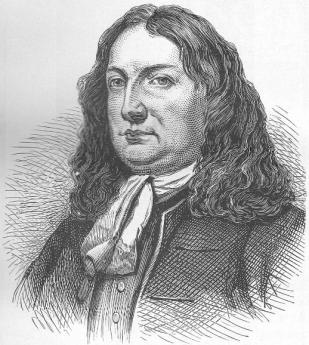
|
| William Penn |
WILLIAM Penn and Oliver Wendell Holmes, both lawyers, can be imagined debating fiercely across two centuries, about The Inner Light. Holmes famously stated his position at the opening of his book The Common Law : "The life of the law has not been logic, it has been experience." Penn, on the other hand, urged his Quaker followers to strip away centuries of books, teaching, and traditions, viewing in quiet contemplation their individual Light Within. Since the other central Quaker belief is that "there is that of God in every man", the implication is that it is open to everyone to know the right behavior by thinking hard enough about it. No books, preachers, ceremonies needed, and in fact, such tokens of society's experience can be badly misleading. Penn did not forcefully pursue how much of the outcome came directly from God and how much was then elaborated by logic; his point was the truth is most readily discovered by contemplation, uncluttered by the world's discussion.
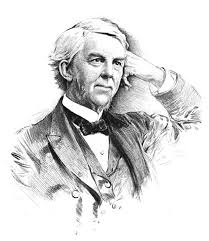
|
| Oliver Wendell Holmes |
That Penn would have acknowledged some truth to Holmes' position can be surmised from the struggle he had with the argument that solitary contemplation cannot lead to an organized moral code of behavior within a society. The example of his time was the Hippie generation, is a more familiar example. What is to prevent a society which depends on silent introspection from concluding that monogamy,personal Hygiene,, and recreational drug avoidance are useless intrusions into the joy of personal freedom? Responses having to do with sexually transmitted disease, harm to the education and welfare of unparented children, disagreeable responses to the undesirable body odors of others, and the spread of addiction by example to those who wish to minimize unnecessary temptations, are all examples of hostility by others who may not have achieved equal illumination from their inner lights. Over centuries of observed experience, societies have reached comparatively similar views on what behavior should be prohibited by force, or discouraged by social pressure. Societies which reach these conclusions may hold themselves open to discussion, but often assert a right to punish those who violate the codes without offering plausible arguments beyond merely mystical ones, closed to debate.
Penn's response to such critiques was of the nature of insisting that Quakers obey the law unless the law insists on behavior prohibited by their religion. Within the realm of unwritten societal pressures, Penn was more relaxed. Sometimes he urged bizarre behavior having to do with hats and clothing, as a silent reproach to society on some issue, but in general, he urged that Quakers consider themselves Protestant Christians as a general guide to behavior. A century after he died, most Quakers were abandoning plain dress and plain speech as not plain at all, but ostentatious. Pointless and therefore ostentatious eccentricity could be harmful to the occasional truly important witness about such things as conscientious objection to war. If the considered purpose is to be taken seriously, eccentric behavior about trivial issues is to be avoided.
Quaker Doctrine and Schism
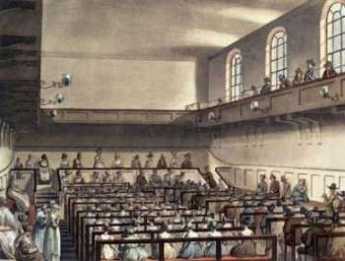
|
| Society of Friends |
The Society of Friends had never promulgated articles of religion to be subscribed, or a catechism to be taught." In this curious manner, a lack of doctrine has become the doctrine. Still more unexpectedly, a religion dedicated to peace and non-violence has mostly defined itself by resisting some proposals so violently that schism was the result. The central propositions can now be best deduced by observing the reasons why dissenters departed the Society, or why agitators were invited to depart. It can be questioned whether the early Quakers who shaped the Society really intended for non-members to define it. And so, eligibility for membership became the place where the doctrine was found, formed and enforced.
In 1691 the first serious rebellion from non-doctrine came from George Keith, who may well have had exactly this issue in mind. Aside from Thomas Lloyd the Deputy-Governor, Keith was the most learned and educated man in the colony, with a large following of admirers. It seems unfair to accuse Lloyd of jealousy, but he was probably Keith's only intellectual equal at the time, and was burdened with the responsibility of governing the colony with full respect for the interests of the then-absent proprietor, William Penn. When Keith raised the concern that unwritten Quaker principles could not be confidently explained or disputed, Lloyd remained silent for a time. However, when antagonism to what Keith was saying reached the point of prosecution and expulsion from the Society of Friends, Lloyd must certainly have been in the background. Keith eventually became an Anglican priest, taking a number of Quakers with him. It must be said on behalf of George Keith that he made the first written protest against negro slavery, sixty years earlier than the more famous actions of the Germantown meeting. His eventual spiritual direction is surely evidence that he longed for closer adherence to Biblical Christian teachings or even rituals. Lloyd, on the other hand, is thought to trace descent from the early Princes of Wales, and could well have over-reacted to ideas which might destabilize power.
Keith may have been more persuasive than he seemed, however. By 1827 the pendulum appears to have swung against excessive thee-and-thou doctrine, however unwritten it may have been. Having experienced one schism from those who wanted more doctrine,
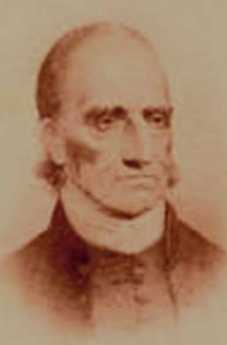
|
| Elias Hicks |
Elias Hicks then split the Society with a return to mysticism, seeking less rigidity and doctrine where Keith had once demanded more of it. After the 1827 separation, Quakers were to remain divided into two religions, the Hicksite and the Orthodox, for a century until Rufus Jones led the two factions to reunite. The banners they waved were "the inner Christ" and the "outward Christ" and for some, the central issue was Biblical doctrine and ritual. For others, it was a matter of balance between obedience and individualism. At present, the Quaker doctrine remains unwritten, although a book called "Faith and Practice" explains what has been customary. Quakers are now a long way from wearing black hats and "plain" speech, and in fact, do come fairly close to what Hicks was striving for. In many ways, the doctrine of "the light within" is held to be sufficient to define the mystical core of Quaker belief, from which everything else may be derived, particularly when it is linked to another central belief, that "there is That of God, in every man." William Penn's famous tolerance of religious freedom, for example, can be viewed as a comfortable belief that if serious people of all religions examine the issues deeply, it can be expected they will all eventually reach about the same conclusions.
The simple formula of "not enough ritual" versus "too much ritual" arriving at its present state of "just enough ritual" must be qualified by two other schisms, however.
When the Revolutionary War came to Pennsylvania, a certain group of Quakers exemplified by Betsy Ross, Timothy Matlack and Nathaniel Greene but led by Samuel Wetherill, wanted to fight for Liberty enough to split off their own church, The Free Quakers.
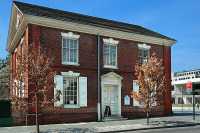
|
| The Free Quakers. |
Although the surface issue was opposition to the war for any reason, in 1781 the Revolutionary War was mostly over, at least in the northern colonies. Several prominent Free Quakers had been read out of the meeting before the Revolution for reasons unrelated to it, and many other joiners to the Free Quakers had apparently not previously been practicing Quakers at all. The larger underlying political upheaval was the Quaker withdrawal from government twenty years earlier. This too was explained as a refusal to fight wars for any reason, but it can also be seen as the dilemma of all religious states, who cannot fairly govern a non-believing minority without either persecuting them or allowing them to usurp. Buying the land from underneath the Indians was one thing; living peacefully alongside the unruly Scotch-Irish of Western Pennsylvania proved to be quite another. The splitting off of a separate sect of Quakers with a different doctrine must be seen in the context of an even larger migration out of Quakerism entirely, into the Anglican, later Episcopal, church, which was favored by the wealthier segment of colonial Quakers, encouraged by some doctrinal adjustments by Bishop White. Even that synopsis fails to capture what was happening. In 1705 the Pennsylvania Assembly, composed entirely of Quakers, signed a petition to King William III ("William of Orange") which had the effect of a bargained compromise: in return for permitting affirmations instead of oaths, the King agreed to extend liberty of conscience under the English Act of Toleration of 1696 to those who subscribed to what would today be called the Apostles Creed. Through the hazy lens of intervening history, it is difficult to see why this was a useful compromise, except for what is implicit. As long as Pennsylvania was firmly Tory, the English king would do any necessary fighting on the frontier, and the pacifist Quakers could continue to control the government. Seventy years later, in 1776, that no longer seemed a workable arrangement, and in fact, the Quakers had withdrawn from the government in 1756.
After the upheavals of adjusting to a new system of government, the nation settled down to enjoy what was the main reward of Independence: vast stretches of unoccupied fertile land to the West. A selectively agrarian segment of Quaker society migrated to Ohio, Indiana, and Iowa. These scattered pioneers did not have Penn, Lloyd, and Logan to guide them, and felt a much greater need for pastoral guidance. In time, mid-western and western Quakers evolved into formal churches with ministers, and colleges to teach the ministers, while the eastern seaboard Quakers remained seated in silent worship, without ministers or music, in "unprogrammed meetings". And so, back to where we started, searching for the proper balance between mysticism and ritual. But primarily among those Quakers who remained unmoved, spiritually and physically, by the fragmentation of what had once essentially been an established religion.
It Ain't Necessarily So

|
| Benjamin Franklin Print Press |
The Protestant Reformation provoked a wide variety of reasonings, and the Quaker position is at one extreme of them. One way of looking at it is to see the Reformation as largely a reaction to the invention of the printing press. At first, there was the impact of Latin versions of the Bible, or Vulgate, which could be read by priests like Martin Luther, and possibly interpreted by them to vary from established Church doctrine. Translation of the Bible into common languages subsequently permitted educated parishioners to read the Bible for themselves and draw their own conclusions. Fundamentalist branches of the church tend to place almost total reliance on what they can read for themselves, and consequently, authenticity is highly important to them. The Quakers go a step further, encouraging each member to come to his own spiritual viewpoint ("There is that of God in every man."), using the Bible as merely one important resource. Although others sometimes regard them as spiritually adrift, the Quaker idea is that if something is really true, everybody who thinks hard about it will eventually come around to much the same conclusion. (Related to this attitude is a strong belief in the ultimate triumph of democracy, and the essential rightness of market-set prices.) Some people try harder than others, of course, and they come to be regarded as "weighty" Friends, likely to have reached the correct conclusion somewhat sooner than others.
One very weighty Friend was Henry Cadbury, an American relative of English candy makers. Henry decided he wanted to spend his life teaching the Bible and went to Harvard Divinity School. He became in time the leading authority in the world on the Book of Acts, editing that section of the Interpreter's Bible, and rising to be Professor of Divinity at Harvard. Henry knew his stuff, so to speak.

|
| Henry Cadbury |
One fine summer day, Henry was seated in the front row of the Haddonfield Meeting. Birds twittered outside the open doors and windows, but otherwise, the gathered meeting was entirely silent. It was even beginning to look as though this meeting would be one of those occasional instances when nothing is said for an entire hour -- a "silent meeting". But, no, a visitor came through the open back door of the meetinghouse, in response to the sign found outside almost every meetinghouse, "All Are Welcome". The man was evidently a fundamentalist, and seeing a large audience all sitting silently waiting for something, he advanced boldly to the front of the meeting and began to speak.
The Bible was the Word of God. Every word in The Bible was true -- literally, and incontestably true. The theme was repeated several times, without an apparent response from the audience.
Finally, Henry Cadbury stirred himself. "Well, it has always struck me...". Oh, oh. Look out, here it comes.
"It has always seemed to me, that the most quotable parts of the Bible, are mainly based on the faulty translation."
The No-Doctrine Doctrine
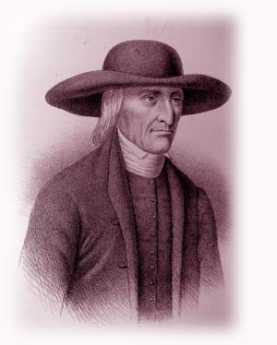
|
| quaker |
Although Quakers have long been famous for good relations with the Indians, both groups strongly prizing simplicity and keeping your word, few Indians converted to Quakerism. Indians would attend the silent meetings and listen respectfully, but in the end, Christian converts were far more likely to convert to the Moravian Church. To resist defining your common beliefs creates automatically a problem for explaining what you believe. It becomes acceptable to believe a wide range of things, but it is also acceptable to believe very little. Not surprisingly, the two great religious schisms of the Quakers have broken their unity on just this point.

|
| A History |
The first great Quaker schism was created by one George Keith (1638-1716), who was born a Presbyterian and died an ordained Episcopalian. For several decades, however, Keith was one of the foremost leaders of the Pennsylvania Quakers, partly as a result of being just about the best-educated man of the Colony. His leadership, however, led him to crave a more defined set of Quaker doctrines, and when he carried this idea too vigorously, he eventually encountered implacable opposition which in time caused him and his considerable number of followers to be expelled from the Society of Friends. (George Keith should not be confused with Sir William Keith, whom Hannah Penn appointed as governor of Pennsylvania in 1717.)

|
| Elias Hicks |
The first great schism was thus about whether there might be too little defined doctrine in Quakerism. The second great schism, by contrast, grew out of the feeling there was too much doctrine. Led by Elias Hicks in 1830, the Hick sites split off from mainstream Quakerism in a quest for more simplicity, less religiosity, more silent contemplation of the Inner Light. In a sense, the outward show of protest in the black hats, plain dress, the plain speech had provoked a reaction that these things were no longer simple, they were ostentatious. Too many people were being "eldered", too many people were being "read out of the meeting" for violating doctrinal rules.
Curiously, both rebels were cast out, but over each following century the church as a whole gradually adopted what was largely their view of things. After Keith, Quakerism became more rigid and formalized. After Hicks, it became more mystical and free-thinking.
By insisting that in spite of turmoil it caused no doctrine was to be defined, Quakers have edged into the negative position of defining what they are not. Unlike the early sects of Christianity, Quakers have discarded the hope of miraculous divine intervention as a reason to behave in a Friendly Christian way. No one is apparently going to revive your bones from the tomb, feed your multitudes with forty loaves, or descend from Heaven and drive your enemies into the sea. Neither a later reward in Heaven nor a forthcoming everlasting punishment in Hell can be regarded as either very likely or much of an incentive to good behavior. Other religions may believe these things and might even turn out to be right, but Quakers feel the unembellished Golden Rule is a sufficiently understandable motive for conduct.
And gentle indirection is often a better way to persuade others than thundering oratory. The story is told of a visitor who found himself in a Quaker gathering and made polite conversation by asking what the Quaker position was on the Trinity. A sweet old gentleman is said to have smiled and said, "We believe in the following Trinity: The brotherhood of man, the fatherhood of God -- and the neighborhood of Philadelphia."
Quaker Carillon

|
| Carillon Bells |
A carillon is a graded series of bells in a belfry, to play tunes. Quakers avoid bells and belfreys, but instinctively grasp the concept of a carillon. Why is that so?
Spoken messages at an unprogrammed meeting, like ringtones of a carillon, are followed by persisting vibrations of varying intensity. Care must be taken, no matter how pure the next message may be, to preserve harmony with the ring decay of the tone it has just followed. Not too soon, not too unrelated.
Overly long delays between messages may be discordant, breaking up the tune unless the message is harmonious. Lacking a tune, the messages fall apart. A silence of even longer length may restore the tune for a gathered meeting, or the next speaker may gently rebuke the interrupter. Sometimes the difference is distinguishable only when you know the personalities. A meeting without a tune is a disappointment, pointing toward individual experience instead of group unity. But death or other catastrophes can have its message destroyed by trite commentary. Rising above triteness can be one way a "weighty" meeting rises above its rank to demonstrate the fearlessness of leadership; failing to rise to an occasion is a way of demonstrating ordinariness.
Financing a Research University

|
| Harvard |
Fifty years ago, only three American universities, Harvard, Yale and Princeton, were considered world-class. The benchmarks for them were Oxford and Cambridge Universities; both British universities had long history and great prestige. Making allowance for wartime disruption, it was also considered pretty classy to study at the Sorbonne, or Humboldt University in Berlin. Sweden, Vienna, Rome were right up there in prestige.

|
| Oxford |
By 2004, a London magazine was offering its view there were thirty American Universities better than anything in the European Community, in particular, Oxford and Cambridge. We'll pass over the Economist's anguished analysis of what's wrong in old Europe, and focus here on what American universities are doing right. They certainly do seem to be doing something right, but nevertheless, it's still possible to be uneasy about where they are going.
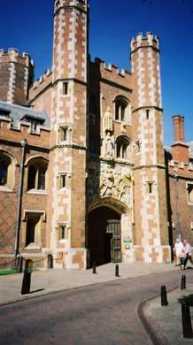
|
| Cambridge |
For example, the top three all have more than ten billion dollars apiece in their endowment funds, and thus each perpetually generates roughly half a billion annually in disposable income from passive sources. You can accomplish a lot of worthwhile academic things with that much money. Operating revenue like student tuition, fees, research grants, and royalties should support normal running expenses, so endowment income is available for new frontiers of learning, research, and social endeavor. These well-run institutions unquestionably do accomplish many innovative and important advances, to the point where it is simply trivial to point out a few areas of waste or misjudgment. Multiplying their annual discretionary funds by thirty offers an overwhelming force for good in the nation, and in the world.

|
| British |
The other twenty-seven premier research universities may not all have ten billion dollars apiece, but they have the Avis or we-try-harder motivation that may make up for it. The nation really does appreciate its worth. Applications for admission outnumber available places twenty to one, would be even greater if more people thought they had a chance to get in. Outstanding professors are in scant supply, commanding higher and higher salaries. In fact, a patient of mine who is a trust and estate lawyer tells me he gets a little uneasy about the growing number of university professors he sees with million dollar estates. A calm view would be that the nation recognizes the value of superior education, and is forcing the pace for a greater supply of it. Unless our economy experiences a disastrous decline, it is reasonable to expect a hundred universities to migrate up the quality chain in the next generation; most of those eligible for it are grimly determined to see it happen. China can make all the widgets it pleases, but that won't make them catch up with this champion competitor. The French can maybe make better wine, but unless they pep up their schools, they're going to have no shot at glory.
Whew. That's intentionally laying it on thick because American academic triumphalism has a darker side to give one pause. In the first place, the arrogance of it shows. Even the European aristocrats, formerly world experts in flaunted put-downs, are irritated; and red America is really sore at blue America. Sprinkling a few research universities into Arkansas and Idaho might relieve regional divisiveness somewhat, but lasting social peace can only derive from starting in the third grade of, say, North Philadelphia, Kensington, and Norristown. In economic downturns, the country would have big trouble financing universal, bottom up, academic excellence. The tragedy is that money isn't the main problem in the science classes of the thirty research universities we already have; an alarming number of those seats are filled with foreign-born students, not even to mention the honors students.
Secondly, the system is already under strain. The families of students are hard pressed by tuitions of fifty thousand dollars a year, and increasingly ready to complain about the inability, of classes of three hundred taught by non-tenured teachers, to justify to them such breath-taking fees. They may not understand educational financing, but they can count, and then multiply two numbers together. Faculty rewards favor research, not teaching, and teaching is what the students think they are paying for, their parents think they are sacrificing for. If what they are truly paying for are just credentials, they worry that affirmative action will cheapen the credentials. One clear sign of unease is the tendency of children from wealthy families to walk about the campus in torn overalls. This may be more than just a fad, it may be a sign they hope to hide from the university's system of redistributive taxation. Some people pay those high tuitions, but mostly tuitions are discounted for the eager family's ability to pay. Wearing blue jeans won't help, the universities demand to see the family's audited tax returns. In my presence, a university president remarked that the system was designed to extract the last dime from every student. The whole middle class is being asked to give until it hurts, for the unspoken goal of elevating a hundred more research universities to world class. Very few question the premise that unmatchable universities are the key to American world eminence. Quite a few, however, have anxiety that it may not work out for each individual. It may only be a lottery with slightly better odds.
Now, let's get to the research part of the research university. In the past ten years, American universities have collectively received six or seven billion in commercial patent royalties; the aggregate now runs appreciably more than a billion dollars a year and it's growing.
The normal arrangement is to give 20% of royalty income to the professor whose name is on the patent. Since most research is performed by large teams, it is possible to imagine considerable inequity and academic bad feeling in this system. In other walks of life, striving for a bigger share of two hundred million a year would cause differences of opinion about fairness. Here and there, you read articles by participants in this system who are concerned over the message it is sending to the students about personal values. Universities that began with a mission to educate the clergy are now seemingly overpraising the big payoffs.
Many business analysts feel that a successful corporation needs to spend 10% of its revenues on research and development. Behind that is a realization that prices and profit margins are largest for new inventions, steadily declining as the new invention attracts competition and eventually becomes a mere commodity. The scientific term entropy is a perfect description of the way world economies seemingly work, like clocks gradually winding down. So businessmen get rid of old products and look for new ones, and the universities are the source of most new ideas and products. Put every last cent into R & D for new products, while the developing countries grind out widgets. If we eventually graduate hundreds of thousands of Americans from unmatchably excellent research universities, the outcome will take care of itself. Even flying airplanes into our tall buildings can't make much difference in this academic arms race. It's essentially how Ronald Reagan defeated the Soviet Union, and it's discouragingly difficult to argue it is totally wrong.
However, you can imagine ways that it might all fall apart. The source of at least half the capital now pouring into the research universities comes from the federal government, particularly the National Institutes of Health, the National Science Foundation and the Department of Defense. It only takes fifty-one votes in the U.S. Senate to change that suddenly, for reasons of national defense, to defend the value of the dollar, to combat inflation, or lots of other reasons. Even now, universities often face annual crises at the end of a funding cycle, when projects have been awarded, people hired, but funding is delayed for uncertain periods of time because of distant political wrangles within the budget process.
That's known as a cash flow problem, and even it is trivial compared with what would happen if federal research funding were delayed a full year. Just look at any university and see all the big tall buildings. They have largely been built to house research activity, and the university would have big difficulty selling them if they were empty. They've usually been paid for with mortgages, and it costs a lot of money to heat, air condition, clean and repair them. Just cut off the cash flow long enough, and you will see how risky it was to get into the research arms race.
Articles of Confederation: Flaws
DURING the twenty-five years (1776-1801) government was in Philadelphia, Americans who had rebelled against tight royal rule uncovered many defects in its opposite -- a loose association of states. Loose associations only preserve fairness by operating with unanimous consent, which is, of course, unfair to a thwarted majority, unless a dissenting minority thwarts itself as a gesture of kindness. The Founding Fathers ultimately devised a formula of weakening power by dividing it into layers -- national, state, county, municipal -- and seeking to confine minority dissent to the weakest political unit. Persuasion and peer pressure were given time to work up the ladder of appeal to a wider, more powerful body of citizens. Bottom upward by choice; top-down only in desperation. Furthermore, persuasion first, force as last resort. An implicit third safety valve emerged: if a good idea is smothered by a local concentration of bigotry, appealing to a wider population includes being heard by more viewpoints. No one claims to have authored this whole prescription or foreseen its hidden benefits; it apparently evolved by trial and error. There was another latent discovery for America's sparse population in a hostile wilderness: maintaining harmony was more essential than efficiency. It would be hard to consolidate more Quakerly concepts of governance in one document. Not exactly assembled, it emerged and was admired. The local Quaker merchants were living proof that harmony made riches for anyone, while force only works against weaker people. George Washington the cavalier general came to Philadelphia and gave it a softly Virginian twist, over and over: Honesty is the best policy. It seems to have originated in one of Aesop's Fables.
 It is not necessary that the [Constitution] should be perfect; it is sufficient that [the Articles of Confederation are] more imperfect. 
|
| James Madison |
Recently examined documentation reveals James Madison, the main theoretician of the closed-door Constitutional Convention, to have been severely contemptuous of state legislatures at this time in his life, and rather severely defeated by John Dickinson in a political quarrel in mid-convention about the powers of small states. From this fragile evidence emerges the idea that in balancing the powers of state and national governments in the "federal" system, it may have been someone else's idea that the greater freedom to move out of an offending state into a more favorable one, would appreciably restrain state legislative abuses. Even with this feature built into the system with the national government to enforce it, Madison is said to have been in a state of depression that the Convention refused to agree to his idea of giving Congress veto power over state laws. It took some time for improved transportation to strengthen this competition between states, but it may not be an accident that Delaware now leads the way in responding to the implicit opportunity.
Philosophy and history are different. The Framers gradually acknowledged a patched charter of tribal allegiance was insufficient and thus adjusted to the idea of a central government. They tweaked a decentralized model of governance to get the states out of the road, without antagonizing them so much they would not ratify it. Although it is commonplace to say the Articles of Confederation were a weak failure, the Articles did reflect American attitudes at the beginning of our formative period. The Constitution would not have been acceptable if the Articles of Confederation had not first been given a trial. By the end of the 1787 Philadelphia negotiation, the nature of the final proposal was to define a few absolutely minimum powers for a national government, identify a few other powers as destructive when in the hands of any other level of government, and leave a vast undefined area: where new and novel problems would be tried out in the states, then passed to a national level if necessary. Anticipating constant mid-course corrections was an important objective for even a minimalist Constitution, not the least of those challenges was to create ways to keep it minimalist. Simplicity itself keeps it hard to change. Starting at the bottom of the layers of government continues to this day to introduce new and unexpected problems to the "laboratory of the states" or even lower, working upward only as proven necessary, or spread nationally only after the solution is highly successful. It is a legacy of slavery, the Civil War, and direct election of Senators (Amendment XVII) that many Americans still fail to welcome the merits of this approach, or lack the patience to try it for their pet ideas. Considering the Articles of Confederation and the Constitution as two documents with continuous goals, we got it right, the second time.
And we got it right in the environment of Eighteenth-century Quaker Philadelphia, where a tolerant examination of new ideas was more venerated than in any other place in the civilized world. With a combination of wisdom and impasse, minor issues were left to the future. It is true this sometimes creates problems of neglect. But it makes it possible to define those few issues which must never change. An unexpected virtue of minimalism surfaced eighty years later: many men understood it well enough to die for it.
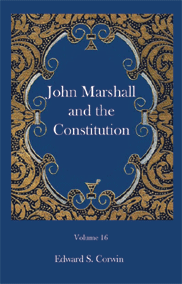
|
|
Edwin Corwin's "John Marshall and the Constitution" |
Much has been written about the separation and balance of powers between the three branches of the federal government. However, the real balance of power in the Constitution in 1787 was vertical, between the central government and the constituent states. Balancing power horizontally, within the central government's branches, is a way of preventing one side of this other argument from tilting the state/federal balance in its own favor, or slowing down the effect of any victories by one side. In other words, it preserved citizen liberty to choose. From this continuing two-dimensional struggle emerges the explanation for filibusters, the seniority system, the confirmation process for Supreme Court and Cabinet appointments. It also calls into question the Seventeenth Amendment, where the state legislatures lost the power to appoint U.S. Senators. In 1786 the states had all the power, in 2009 state power is much diminished; but it is not entirely gone by any means. It is true the cry for states rights, essentially an appeal to the Deity for Justice is futile. If states are to wrest power back from the federal government, it will be by the adroit exercise of powers buried within the balanced powers of the federal branches, but it can succeed if the public ever wants it to succeed. The Framers seem to have overlooked the possibility that federal power could someday outgrow its blood supply, simply growing too big to manage. It is also true the Framers neglected the possibility of a protracted period of disagreement between two halves of the electorate. At least in these particulars, there is room for the further evolution of the Constitutional principle.
While features of the present Constitution can sometimes be linked to the correction of flaws in the Articles, one by one amendment never seemed to be quite enough. Subsequent analysis of Original Intent has often had to contend with the unspoken intent of earlier negotiators to strengthen partisan advantage in later struggles. The political battles being fought at the beginning, which except for slavery are substantially the same today, were sometimes being promoted for reasons which now seem merely quaint. Fine, everyone can agree it was complex. Still, there was a recurring uneasiness: what was the underlying flaw in the Articles? What, as they say, is the take-home point?
One widely accepted summary, probably a correct one, of what was centrally wrong with the Articles of Confederation, lies in a concise observation, which follows, from Edward S. Corwin's book John Marshall and the Constitution:
"The vital defect of the system of government provided by the soon obsolete Articles of Confederation lay in the fact that it operated not upon the individual citizens of the United States but upon the States in their corporate capacities. As a consequence, the prescribed duties of any law passed by Congress in pursuance of powers derived from the Articles of Confederation could not be enforced."
And that's how many Revolutionary Americans, possibly most of them, had wanted to have it. They were in revolt against all strong government, not just the King of England. They surely would have applauded Lord Acton's declaration that "All power tends to corrupt, and absolute power corrupts absolutely." Thirteen years of near-anarchy taught them they must at least give some limited powers to a central government, but it was to be no more than absolutely necessary. For some, the Ulster Scots, in particular, even the absolutely minimum amount was still just a bit too much. In effect, these objectors wanted a democracy, not a republic.
To deconstruct Professor Corwin's analysis somewhat, the equality-driven followers of Thomas Jefferson believed the insurmountable obstacle for uniting sovereign states is that they are sovereign, and won't give it up. The merit-driven followers of Alexander Hamilton, Robert Morris, and George Washington bitterly resisted; in business and in war you need the best leaders to rise to power. The function of common men is to select the best among themselves to be leaders. Only James Madison seems to have grasped that ideal government might tend more toward a republic for purposes of the enumerated federal powers plus enumerated powers specifically denied to the states. For lesser issues, perhaps a purer democracy would be just as workable. However, in operation, it took scarcely a year to discover that the common man would not automatically select the best man he knew to be his representative. In fact, there exists a considerable populist sentiment, that wealth and success outside government are actually disqualifications for office. To some extent, this reverse social Darwinism is grounded in an unwillingness of the upper class to serve in government, perhaps because service to the country interferes with the lifestyle of unrestrained power and wealth which other occupations allow, but is forbidden to public servants. In any event, we persist in the fruitless argument whether America is a democracy or a republic; it was designed to be a mixture of both. Within the time of the first presidency, the unattractive realities of mixing human nature with elective politics transformed the meanings of the Constitutional document to something that was never written there, and other nations have largely failed to grasp. It apparently also worked a major transformation in its main author. James Madison first quarreled with his ally, Alexander Hamilton, and joined forces with the Constitution-doubter Thomas Jefferson. His mentor and idol, George Washington, essentially never spoke to him again.
---------------------------------------------------------------------------------------------------------------
States rights no longer confronts America directly, because the Founding Fathers managed to get around it until the Civil War, and then the Fourteenth Amendment enabled the federal judiciary to attenuate state sovereignty somewhat further without eliminating the architecture of a federation of states. In other words, in two main steps we deprived the states of some sovereignty, but no more than absolutely necessary, and we took more than a century to do it. The European Union currently faces the same obstacle; this is how we solved it. If they can get the same result in some other peaceful way, good luck to them. Our framers used the language "Congress may...or Congress may not..." They only dared to strip state legislature of a few powers because they needed the legislatures to ratify the Constitution, a gun you can only fire once. Thus, they forbade states the right to issue paper money, the power to interfere in private contracts, and such, as enumerated in Article I, Section X, where the operative phrase is "The states are forbidden to..". The framers were willing to strip the unformed Congress of many more specific powers than the all-too-existing states; the Constitution can be read as a proclamation of the powers which any central government simply must possess. There might be other desirable powers, but here is the minimum. After eighty years, individual Southern states asserted their unlimited powers extended to nullification and secession, and because of a perceived need to preserve slavery would not back down. The Constitutional consequence of this national tragedy was the Due Process section of the Fourteenth Amendment, which has since been purported by the Supreme Court to mean that whatever the federal government may not do, the states may not do, either. However, Due Process traces back to the Magna Carta and has been so tormented by an interpretation that for the purpose stated, it is growing somewhat too elusive to remain useful. For historical reasons, we never gave a fair trial to the original proposal to address the federal/state dilemma. The Constitutional Convention was held in confidence, many delegates changed their minds along the way, and many ideas were more perceived than enunciated. It is plausible that the original strategy originated with Madison's teachers and emerged from many discussions, but there were several delegates in attendance with the sophistication to originate it. In a convention of egotists, there were even a few who would put their ideas in someone else's mouth.
The concept of how to curtail power in a non-violent way, can be called Regulatory Competition. Mitt Romney seemingly plans to promote the idea as a central feature of his political run for President of the United States, using a variant he has developed with Glenn Hubbard, the Dean of the Columbia University School of Business. The idea does still work reasonably well with state taxes and corporate regulation. If a state raises a tax, estate tax for example, in a burdensome way, people will flee to a state with more reasonable taxation. Corporations have learned how to shift legal headquarters to Delaware and other states which court them, and in really desperate cases will move factories or whole businesses. There is little doubt this discipline is effective, and little doubt that some cities and states have been punished severely for encouraging an anti-business environment. Whether the Fourteenth Amendment could be cleverly amended to expand this competitive effect without reintroducing segregation or the like, has not been seriously considered, but perhaps it should be. There are however not too many alternatives to consider.
As far as advising our European friends is concerned, it would be important to point out that the original version of Regulatory Competition completely depends for its effectiveness on the freedom to flee to some other state within the union. A common language is a big help to unity, but the ability to move residence is essential, so for practical purposes, both a common language and freedom of migration are required. Underlying such concessions is a sense of tolerance of cultural differences. That is unfortunately where most such proposed unions have either resorted to violence or failed to unite. And of course, the power which might otherwise be abused must then be shifted from the federal, back to a state level. What surfaces is a sort of one-way street? It remains far easier to devolve into little statelets than to unite for the benefits of scale. A working majority under the likes of Thomas Jefferson might have been assembled in the Nineteenth century but was held back by coping with the expanding frontier. During the Twentieth century, it would have been held back by the need to deal with world power. The Second Tea Party seems to have some inclination along these lines, but it remains to be seen whether some overwhelming need for world power will once more overcome the obvious national ambivalence about it.
The revised proposal for the regulatory competition takes the proposal to a different level, possibly a more workable one. Workers in the United States can freely move from one state to another but are restrained by national laws from equally free movement between nations. Removing that barrier makes the European Union attractive, although it inflames local nationalism. Since it seems more palatable to allow the currency to move, perhaps a little tinkering would be sufficient to permit uniform monetary rules to be the hammer which forces nations into permitting free trade on a global scale. The people themselves can remain at home in their national costumes, perhaps perfecting their religions in more churches and language skills in more schools. Meanwhile, the insight of Adam Smith would prevail for the long-term prosperity of everyone. Each party in a transaction feels enriched by it, the seller preferring to have the money, and the buyer preferring to own the goods. Multiplied a trillion-fold, these improvements in everyone's condition result in the steady enrichment of all.
Fees for Trial Lawyers, Section 1983 Variety

|
| Abuse |
We are indebted to Nicholas D'Alessandro, Jr.,Esq. for opening our eyes to the marvels of "1983 cases". That's lawyer slang for Section 1983, Chapter 21 (Civil Rights), Title 42 (The Public Health and Welfare) of the United States Code. In effect, we are talking about a Reconstruction-era law passed in 1871, to protect ex-slaves from persecution by local Southern governments, "acting under color of law". During the entire first century after its enactment, about 270 lawsuits had been brought under this seemingly unobjectionable law.
Well, last year alone there were over 30,000 cases. The number has been steadily growing in the past twenty years, even though it is commonly believed Reconstruction is a best-forgotten episode in a tragic era of the past. Without significant objection, it is generally accepted that the main stimulus for 1983 cases is the recent (and extraordinary) feature of awarding full compensation for legal costs of the plaintiff. In other nuisance lawsuits, the contingent-fee system awards the lawyer a percentage (usually 33%) of the damages, making it unattractive to pursue minor cases. In a 1983 case, however, a trial lawyer could bill $350 an hour for many hours, while pursuing a case worth $100 in damages. A large proportion of these cases allege a local police officer deprived a citizen of his civil rights in the course of arresting him for a traffic violation.
Taken in the aggregate, awarding billions of dollars in fines against local governments can be imagined to represent a punishment of local taxpayers for not reigning in their police officers. They represent a signal from the federal government that it believes local law enforcement is too vigorous in the pursuit of minor infractions and creates an incentive to be less so. Alumni of the Vietnam War protests and other civil disobedience are probably sympathetic if they ever find themselves on juries in such cases.
In recent years, a growing source of 1983 cases have been related to local zoning laws and regulation. Many citizens claim they have been stripped of their property rights when forbidden to put a filling station in their front yard. Others darkly suspect local officials of taking secret bribes to re-sell the property to Wal-Mart, whenever government confronts the owner with taking his property by right of eminent domain. In cases like this, the sympathetic jurors are likely to be Jeffersonians, with a hunting rifle hanging above their fireplace. Such fiercely independent people, however, are given pause by knowing they must appeal the action of local officials to the federal government, acting under a federal law called Section 1983. The frustration must be intensified by learning the U.S. Supreme Court has declared it will not second-guess a local government by granting a writ of certiorari unless the action "offends our conscience". A careful search of the records of the Third Federal District (our own) fails to discover a single instance when that conscience was offended enough to intervene.
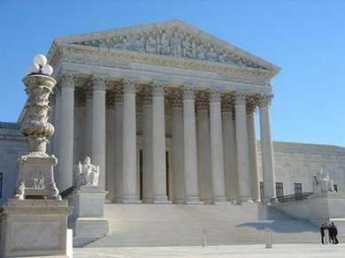
|
| Supreme Court |
But, wait. In 2005, the public flamed up. In keeping with past tradition, the Supreme Court again found its conscience was not offended by the exercise of eminent domain by the City of New London, Connecticut. New London is experiencing hard times, potentially made worse by the threatened closure of the nearby submarine base. Accordingly, it seemed in the public interest to condemn some small private properties in order to assemble a large parcel of land for commercial development. Libertarian groups took up the case of Ms. Kelo, a dispossessed small landholder, and carried it to the U. S. Supreme Court, who declared that the eminent domain didn't bother them.
But Kelo v. City of New London did bother a lot of citizens all over the country. Even making allowance for the hostility to the eminent domain which has been growing for decades, and recognizing it is being stirred up by ideological groups, the Supreme Court still had crossed some sort of invisible line. What New London does with its waterfront is of small concern to the rest of the nation, but for the Supreme Court to declare it doesn't really care about such trifles is quite another matter. A man's home has always been referred to as his castle in this country, and title to a great many properties is only completely clear if you acknowledge the power of that gun on the mantelpiece. Add to that the recent extraordinary rise in real estate prices, and you might expect small property holders to be highly resistant to state takings. One must be sympathetic with the dilemma of the judiciary in trying to balance such intense attitudes with the general welfare of the community, particularly a community with floundering economics. But a Supreme Court that can't be bothered with trifles, that don't worry unless you light a fire under them -- had better expect to get fires lit under them.
Unintended Consequences for Advanced Placement
The Nov. 23, 2004 Wall Street Journal writes that "Elite High Schools Drop AP (Advanced Placement) Courses," thus taking me back to 1943, when I guess I started the idea now being dropped.
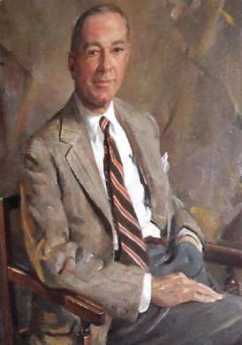
|
| Allan Heely |
The then Head Master of The Lawrenceville School, Allan V. Heely, came around to Yale to visit recent graduates in their college freshman year. For secondary school principals that would, in itself, be quite a novelty today. We certainly considered it a novelty to have him actually buy us a beer, since six months earlier we would have been instantly dismissed from school without hope of appeal, just for one provable beer. The alcohol issue to one side, I can see in retrospect that the Head Master made a serious effort to socialize with his senior students, inviting them to tea every afternoon, and coffee after Sunday chapel. What might sound like quaint Victorian ceremonies to an outsider were in fact conscious efforts to create a role model of the mythical Renaissance Man. He and the school chaplain played piano duets and sang witty songs of their own composition. He brought in famous guests from New York and Philadelphia and made them perform as conversationalists. Jacques Barzun and John Erskine were memorable examples. I can even see in retrospect he was displaying his elegant talented wife as an example of the sort of woman we were urged to marry. To visit his graduates in their early formative years in college was entirely in keeping with his concept of education as the basis for character development. There was even a quote from J. P. Morgan: "Brains don't make success, character does."
Well, for all his effort to be friendly, when the Head Master visits you at college it's a little hard to know what to talk about. So, to be helpful, I pointed out that the science courses were not smoothly integrated between secondary school and college. An example was the contrast between my roommate (Peter Max Schultheiss, now Professor Emeritus of Electrical Engineering at Yale) and me. Pete had scored 100 -- no mistakes on any quiz, all year -- in both Chemistry and Physics, whereas I had not taken either course at Lawrenceville at all. Yet, here were both of us in the same Freshman introductory courses at Yale, required before more advanced courses could be taken. Naturally, Pete had an easier time of it, but at the end of the year we were at the same point, and we both felt he had wasted his time taking the same courses twice. Why couldn't Lawrenceville make an arrangement with Yale to waive the requirement for some introductory courses, saving educational time for something else?
Mr. Heely did a lot better than that. At that time, ninety seniors from Lawrenceville went to Princeton every year, a hundred seniors from Andover went to Yale, and about the same number went from Exeter to Harvard. A pleasant dinner was arranged for the three headmasters and the three University presidents, at the conclusion of which the deal was done. Advanced placement was put into effect. As I understand it, the AP system gradually spread, and last year 14,900 secondary schools offered Advanced Placement courses. You could play around with those numbers and conjecture several million college person-years of education were put to better purposes over the last 62 years. It's a really nice feeling to believe that one twenty minute conversation by two eighteen-year-old boys could have such a useful effect.
So, now what's the problem with these elite high schools, that want to drop AP courses? It's hard to speak on their behalf, but I'm in a unique position to know the original idea has twisted out of shape a little. The original purpose was to eliminate mandatory repetition of introductory college courses, but nowadays competition for admission is so ferocious that repetition is considered a very smart thing, to beat the system. It works up and down the educational system, awarding a high score for coasting through a course the second time. Advance placement thus becomes a bribe not to do that, and the power of the bribe is prestige for admission to some higher level. With 15,000 high schools (like Garrison Keillor's Lake Wobegon) claiming to provide superiority, there has to be accreditation, and for that, there has to be a standardized test. Before long, the curriculum is dominated, not by what the teacher thinks is superior, but by what is likely to be on the accreditation test. In effect, we get a French-like system in which the bureaucracy dictates what is best for the Leaders of Tomorrow. That's quite different from the time when outstanding secondary schools produced an unusually good product, and colleges were asked to recognize it. It's hard to say who's been corrupted here; probably everybody, because it's mass-produced accreditation. If you want to evaluate whether to permit more or fewer waivers for a certain school, you need to evaluate earlier waivees when they reach Junior or Senior level in whatever college had previously done some waiving. Only at that longitudinal point in the process is it possible to conclude whether the waiving of repetitious introductory courses had been useful or harmful.
Underneath all of this is the self-fulfilling prophesy that graduation from a handful of elite colleges will assuredly lead to success in life. If what we need are leaders who are vicious competitors, practiced in circumventing hurdles on the way to getting to the top, credentialism is perhaps a regrettable necessity. But if, as Mr. Morgan said, it's character that matters, gaming the system is not a completely ideal way to promote it.
11 Blogs
William Penn, Robert Barclay and the Ranters
The early Quakers were hard to tell from other Dissenters. Robert Barclay and William Penn set out what made them distinctive.
Robert Barclay Justifies Quaker Meetings
 Robert Barclay, one of the handfuls of English philosophers of enduring note, came close to establishing the doctrines of the Quaker Church, a religion with no formal doctrine.
Robert Barclay, one of the handfuls of English philosophers of enduring note, came close to establishing the doctrines of the Quaker Church, a religion with no formal doctrine.
William Penn, Justice Holmes, and the Inner Light
 The hippies of the 1960s can be understood as just one extreme swing of an old, old pendulum.
The hippies of the 1960s can be understood as just one extreme swing of an old, old pendulum.
Quaker Doctrine and Schism
 Without a written doctrine, outsiders get a glimpse of Quaker belief from what they think is worth arguing over.
Without a written doctrine, outsiders get a glimpse of Quaker belief from what they think is worth arguing over.
The No-Doctrine Doctrine
 The doctrine of Quakerism is to have no doctrine. It has provoked two main schisms in the church; George Keith making a plea for at least some doctrine, Elias Hicks leading a later move back to simplicity.
The doctrine of Quakerism is to have no doctrine. It has provoked two main schisms in the church; George Keith making a plea for at least some doctrine, Elias Hicks leading a later move back to simplicity.
Quaker Carillon
 In an unprogrammed Quaker meeting, respectful pauses between messages should be long enough to form a "gathered opinion". Not too long, of course, or lacking some external signal of what the subject is. Gathered meetings and fragmented ones may sound alike to strangers, but little signals that others are listening can be found in the intervals of silence.
In an unprogrammed Quaker meeting, respectful pauses between messages should be long enough to form a "gathered opinion". Not too long, of course, or lacking some external signal of what the subject is. Gathered meetings and fragmented ones may sound alike to strangers, but little signals that others are listening can be found in the intervals of silence.
Financing a Research University
 Responding to staggering financial temptations, our most prestigious universities are beginning to put both themselves and the rest of the country at unacceptable risk.
Responding to staggering financial temptations, our most prestigious universities are beginning to put both themselves and the rest of the country at unacceptable risk.
Articles of Confederation: Flaws
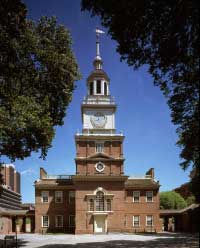 Some subtle features make the Constitution a vast improvement over the Articles of Confederation.
Some subtle features make the Constitution a vast improvement over the Articles of Confederation.
Fees for Trial Lawyers, Section 1983 Variety
 Suing your own town is now getting so popular it clogs the courts.
Suing your own town is now getting so popular it clogs the courts.
Unintended Consequences for Advanced Placement
 The story of how the author complained to his head master about preparation for college and how it led to the concept of Advanced Placement courses in high schools.
The story of how the author complained to his head master about preparation for college and how it led to the concept of Advanced Placement courses in high schools.